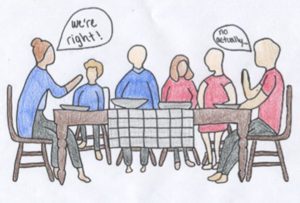By Roby Tan

Most teens would agree that family reunions are stressful; one side of the family feuds with the other side by spewing hateful words on opposing views. Kids silently finish meals and sit amongst themselves patiently waiting for the political debate to simmer down. They sit through all the screaming and name-calling projecting from the dinner table. Their relatives forget that they’re each other’s family. They are divided by their differences in political opinions.
Teenagers often stay quiet about political matters since they think that their opinion isn’t valid or important enough. Teachers stray away from discussions about politics to not belittle anyone’s opinions or influence their students’ views. They don’t want to get in trouble with the students’ parents, and they avoid phone calls from home.
Politics encourage educated debate among peers, yet the youth tend to leave this topic untouched. They might get in trouble at school for writing a controversial essay even though students are taught to exercise their freedom of speech. Instances such as writing controversial essays for a school publication or walking out of class to protest may lead to punishment. Some schools may even find these acts disruptive which discourages students from participating in activism. This is caused by the generalization that all teens just want an excuse to get out of class or to say something distasteful about school.
The Institute for Social and Economic Research at the University of Essex conducted research from 2011 to 2012 that 42.4% of 16 to 24-year-olds had no interest in politics. It is understandably difficult for anyone, especially teens, to relate to something they have no direct connection with. This is why most teens don’t pay much attention to the news (which is full of older people arguing about serious matters they don’t even understand). It also doesn’t help how most adults assume teens are still too young or “politically immature” to understand current events. Adults tend to forget that the legal voting age is 18 which technically means a teenager could cast their own vote: a vote that is just as important as a 40-year-old’s vote.
According to the Visual Teaching Alliance for the Gifted & Talented, 65% of today’s generation grasps ideas the best through visual learning, so it may be easier to encourage the youth to participate in politics if they’re exposed to current events in an educational setting. It’s more challenging to spark an interest in politics if the subject is avoided because of fear of conflict, yet people don’t consider how schools mold students’ minds to conceptualize bigger and better ideas. Instead of hindering the exposure of politics to students, schools should be more open and provide a safe space for students’ beliefs.
Teens have the right to gain more knowledge regarding the world of politics without adults shutting them out. It is important for teenagers to feel that they matter, and their opinion on any matter is valid. The youth is the future, so educating them about political awareness could assure previous generations that they are in good hands.











